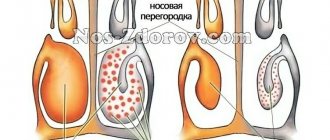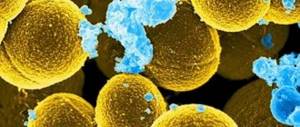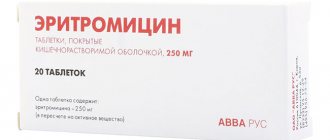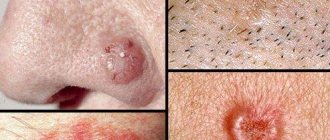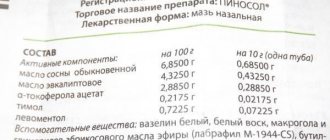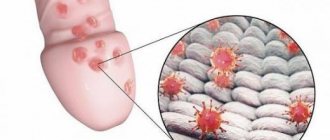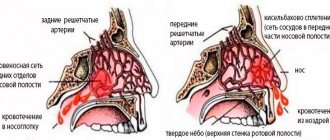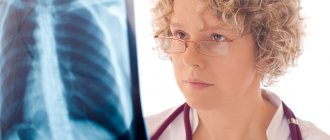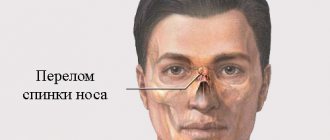Author, editor and medical expert – Klimovich Elina Valerievna.
Last updated date: 08/29/2020
Quantity 929.
Nasal congestion, or, as doctors say, nasal obstruction, is the most common complaint of otolaryngologist patients. Difficulty breathing not only causes discomfort, but can also provoke complications that worsen health and quality of life.
Signs of rhinitis
If we are talking about acute rhinitis, then, as a rule, its appearance is secondary and is a symptom of other infectious diseases. Therefore, first of all, a person begins to complain of general malaise - headache and muscle pain, high fever, muscle weakness. Subsequent manifestations of rhinitis depend on the stage of development of the disease:
- The first stage is dry irritation. In the first hours of the development of the disease, a burning sensation in the nasal cavity and frequent sneezing appear, and the eyes begin to water. Then a feeling of nasal congestion occurs and the sense of smell is lost.
- The second stage is serous discharge. This stage is characterized by a runny nose, which is manifested by strong and clear discharge. Swelling of the mucous membrane appears, as a result of which the voice changes.
- The third stage is mucopurulent discharge. A distinctive feature of this stage is thick purulent discharge of yellow or green color.
If left untreated, rhinitis can become chronic, which is manifested by frequent nasal congestion and thick discharge. After some time, the sense of smell decreases, and breathing difficulties cause headaches.
With chronic rhinitis, a viral infection can spread to the pharynx, causing itching and redness of the mucous membrane, and coughing. Diseases of the lower respiratory tract may develop, and complications may spread to the eyes and ears. Constant nasal discharge requires frequent blowing of the nose, which is why the skin near the nose begins to turn red and peel. Therefore, treatment of a runny nose should be started on time.
Treatment of rhinitis in adults
How and with what to treat rhinitis in adults? Among the methods of treating rhinitis are:
- Non-medicinal.
- Medicinal (local or internal effects).
- Surgical.
- Physiotherapeutic.
Before you buy nasal drops, you should try to change a few things in your everyday habits:
- If your nose is stuffy and a severe runny nose prevents you from breathing normally, your head should be slightly higher than your body during sleep.
- It is necessary to minimize the number of plush toys, carpets, upholstered furniture and books in the room, because dust accumulates in them.
- Avoid household chemicals, air fresheners and paints and varnishes during illness, as these factors can aggravate the course of rhinitis.
- Give up bad habits, such as tobacco addiction.
- Humidify the air and regularly ventilate the room where the patient is.
- Drink enough fluid to normalize the rheological properties of mucus in the nasal cavity.
How to treat rhinitis with medications?
The choice of drug depends entirely on what type of rhinitis is diagnosed in the patient. Relief of the main manifestations is a symptomatic treatment that does not eliminate the cause of the underlying disease.
Symptoms of nasal congestion can be eliminated by using certain drops:
- Naphthyzin are vasoconstrictor drops after 4-6 hours (0.05% solution);
- Xylometazoline – 2 times a day (0.05% solution);
- Sinupret is a combined remedy for eliminating nasal discharge.
It should be taken into account that the use of nasal drops should not exceed more than 7-10 days. Since various side effects associated with disruption of the olfactory and cleansing functions of the nose may occur when using them. If you feel a burning sensation, local irritation and dryness in the nose, it is recommended to stop taking these medications.
When acute rhinitis becomes severe, doctors recommend using:
- Aqualor drops or Aqua Maris, and also for swelling, drops (Naphthyzin, Galazolin, Saparin) are instilled into the nose.
- Antiviral agents (Arbidol, Anaferon, Grippferon) and antimicrobial ointments (Vifirol, Oksolinovaya and asterisk) fight the disease well.
For signs of rhinitis against the background of normal body temperature, the following is prescribed:
- home (not bed) rest,
- plenty of warm drinks,
- thermal procedures (hot foot baths and warm compresses on the back of the hands).
For acute rhinitis, physiotherapeutic methods are used
- ultraviolet irradiation locally and on the area of the soles (6-8 biodoses);
- UHF (nose area for 5-8 minutes, daily for the first 3 days, and then every other day);
- microwave exposure to the nasal area;
- inhalations are effective (warm-alkaline, alkaline-oil, oil-adrenaline, phytoncides, honey, etc.).
Surgery
Surgical interventions are performed for medical reasons for the treatment of chronic rhinitis when drug therapy is ineffective. The operation can only be performed during remission.
Some conditions will require surgical treatment:
- Removal of nasal polyps;
- Correction of deviated nasal septum;
- Excision of congenital anomalies of the nasal cavity;
- Cauterization of the adenoids on the back of the pharynx.
Causes of rhinitis
In order for the treatment of rhinitis to be effective and quick, the cause of the disease must be correctly established. An incorrect diagnosis can lead to various complications.
The following reasons can be named that lead to inflammation of the nasal mucosa:
- viral infections,
- accidental penetration of pathogenic microorganisms into the nasal cavity,
- reduced immunity,
- hypothermia of the body,
- allergens,
- entry into the nasal cavity of chemically harmful and dangerous substances,
- prolonged stay in rooms with dry air,
- long-term use of drugs with vasoconstrictor or vasodilator effects,
- poor circulation in the nasal cavity.
Types of rhinitis
There are the following types of rhinitis:
- spicy,
- chronic,
- vasomotor,
- allergic,
Acute rhinitis
Acute rhinitis occurs due to the penetration of various viruses or bacteria into the body. As a result of hypothermia, the body's overall resistance to pathogenic microorganisms decreases, which can also provoke the development of acute rhinitis.
As a treatment, you can use warm baths with the addition of essential oils, for example, eucalyptus, mint or fir. As a rule, the acute period of the disease passes approximately on the third day.
Chronic rhinitis
Chronic rhinitis usually lasts a long time. The main reason for this duration is incorrectly prescribed treatment or some complications. As a rule, this form of the disease occurs in adults, but there are cases when chronic rhinitis occurs in children. In order to prescribe the correct treatment for rhinitis, you should know the symptoms exactly.
Treatment of the disease should be carried out immediately after diagnosis, as difficulties in breathing, frequent nasal congestion, lack of smell, cause a feeling of discomfort, disrupt the quality of life, and affect the respiratory system.
Vasomotor rhinitis
Vasomotor rhinitis develops due to the entry of any allergens into the nasal sinuses. Among them may be house dust, hair or the smell of pets, plant pollen. In adults, this form of the disease may appear due to long-term use of vasoconstrictor drugs. In this case, the human body stops reacting independently to the vessels.
Allergic rhinitis
Allergic rhinitis is the sudden onset of a runny nose. Accompanied by strong mucus discharge from the nose, itching, and frequent sneezing. Allergic rhinitis may recur with some frequency if an allergen is present in the air that causes these symptoms.
Nasal congestion without snot as a symptom of illness
Above we have already discussed the most common causes of nasal congestion. Determining the type of congestion will help you more accurately diagnose the illness your body is signaling.
Constant nasal congestion
There is no hint of a runny nose, but the nose is not breathing! Neither drops, nor air humidification, nor folk remedies help. Causes of chronic nasal congestion: nasal polyps, deviated septum, hormonal problems, environmental situation.
- St. John's wort - a medicinal herb
Be sure to see a doctor!
"Night" nasal congestion
If you regularly have a stuffy nose at night, pay attention to the microclimate in your bedroom and your body position during sleep.
To humidify the air in the room (especially important during the heating season), place vessels with water in the bedroom, hang wet sheets, and spray the curtains with a spray bottle before going to bed. Newborn babies react especially acutely to dry air.
If nasal congestion during sleep is accompanied by snoring, try changing your position and choosing an orthopedic pillow.
Also, the cause of nighttime nasal congestion may be an allergy to linen mites or a feather pillow.
If you have difficulty breathing through your nose at night and have a dry cough, this may be a sign of acute sinusitis. See a specialist!
"Morning" nasal congestion
A common complaint. Among the possible reasons: too dry air, allergies and the most unpleasant thing - the onset of sinusitis. A constantly stuffy nose in the morning may also indicate the presence of vasomotor rhinitis.
If humidifiers and changing pillows and mattresses do not help, be sure to visit an otolaryngologist.
My nose is constantly stuffy... What should I do? The first thing that comes to mind is to blow your nose more often. Yes, our body wants to quickly get rid of the “traffic jam” that prevents us from breathing normally. But when we begin to blow our nose frequently and forcefully, the already inflamed vessels in the nasal mucosa swell, making breathing even more difficult.
Symptoms of rhinitis
Depending on the type of rhinitis, as well as the stage of its progression, the symptoms of this disease may vary. From dry nose to profuse purulent discharge.
The main symptoms of rhinitis include the following:
- lack of free nasal breathing,
- frequent sneezing,
- congestion in the ears,
- headache,
- feeling of dryness, burning in the nose,
- severe congestion,
- complete lack of sense of smell,
- the appearance of mucous discharge from the nose.
Symptoms
The general clinical picture includes the following signs:
- congestion in the ears;
- headache;
- dry throat, as a person is forced to breathe through the mouth.
If the nose is stuffy due to allergic reactions, then the overall clinical picture may be supplemented by the following:
- tearfulness;
- cough for no apparent reason;
- copious nasal discharge.
Allergy symptoms
The presence of such a symptom in chronic otolaryngological diseases may be accompanied by the following specific signs:
- headache;
- drowsiness;
- disorientation;
- hearing loss.
If the cause of congestion is an acute respiratory disease, the following clinical picture is observed:
- increased body temperature;
- weakness, drowsiness;
- headache;
- copious nasal discharge.
Congestion during tumor formation is no exception. In this case, the clinical picture is supplemented by the following signs:
- pain in the nose;
- breathing problems;
- as the tumor grows, the patient feels the presence of a foreign body in the nasal cavity;
- impaired sensitivity of facial skin;
- nasal deformities;
- swelling of the eyelids;
- tinnitus, dizziness.
In some cases, there is an increase in the submandibular or cervical lymph nodes with a local increase in temperature.
If nasal congestion is caused by the presence of a foreign body, then the patient may be bothered by the following signs:
- nasal congestion is observed only on one side, where the foreign body is located;
- periodic mucous discharge;
- nosebleeds;
- pressure, feeling of severe discomfort in the nasal cavity;
- itching and burning.
If you have the above-described clinical manifestations, you should seek medical help and not self-medicate. Otherwise, the disease may become chronic, which is fraught with serious complications. In this case, a significant deterioration in hearing or its complete loss is no exception.
Diagnosis of rhinitis
Rhinitis is identified based on the symptoms inherent in the disease. However, situations arise when the symptoms of ordinary rhinitis should be distinguished from symptoms that characterize the development of an infectious disease in the body. Any infectious disease has its own symptoms.
Rhinoscopy is a comprehensive examination of the ENT organs. During the examination, it allows you to determine the form of rhinitis. If complications are detected, an x-ray of the sinuses is prescribed.
Types of medical care
There are three types of treatment.
It could be:
- Etiological.
- Pathogenetic.
- Symptomatic.
Each of these types has its own specific purpose.
The most reliable and correct method of treatment is etiological. The fact is that in this case they find the main cause of the disease and act directly on it. It's like destroying a tree - starting from the root. For example, infectious diseases are treated with a similar method. Including syphilis. It is treated with a group of antibiotics. As a result, the very root of the problem – the causative agent of the disease – is destroyed. The problem with this treatment method is that it is not always possible to find out the cause of the disease.
The next type of treatment that is used when the first method does not help is pathogenetic. In this case, the symptoms of the disease are known, but there is no clear cause. This is how they work in oncology. In this case, the harmful tissue is removed through surgery and healthy tissue is left.
If even in this case it is not possible to defeat the disease, then a symptomatic treatment method is undertaken. Thanks to it, the cause of the disease is not eliminated, but only the state of health improves - a person’s pain is relieved and the visible manifestations of the disease are hidden.
Treatment of rhinitis
Medicines, physiotherapy, and folk remedies can help cope with difficulty breathing and relieve the inflammatory process in any form of rhinitis.
Medicines for the treatment of rhinitis
It is recommended to start taking any medications only after consultation with your doctor. to treat rhinitis :
- vasoconstrictors;
- moisturizing;
- antiviral;
- herbal preparations;
- antibacterial.
Vasoconstrictor medications. To treat rhinitis, vasoconstrictor drops are used, which cause narrowing of the blood vessels of the nasal cavity and reduce swelling of the mucous membrane. As a result, the nasal passages expand, and nasal breathing improves.
Moisturizers. Moisturizers are good to use in combination with other medications. They improve the properties of mucus and facilitate its removal.
Antiviral drugs. Antiviral drugs are more suitable for the prevention of rhinitis and in the earliest stages. For prevention, the medicine should be used when there is an immediate threat of infection and continue until the danger of infection disappears.
Herbal preparations. They contain essential oils, including mint oil (menthol). In the nasal cavity it has a refreshing and disinfecting effect. Homeopathic remedies in the form of sprays, drops, etc. are also widely used.
Antibacterial drugs. To treat rhinitis caused by a bacterial infection, antibacterial drugs are used, which are available in the form of a dosed aerosol. These medications have an anti-inflammatory effect and act on bacteria.
Physiotherapy
Physiotherapeutic procedures can also be used to treat the inflammatory process of the nasal membrane. These include ultraviolet irradiation, various inhalations and heating. The integrated use of medication and physiotherapeutic therapy makes it possible to obtain a visible effect in the treatment of rhinitis.
Folk remedies
Nature gives us many good recipes that can speed up the healing process. To reduce the pronounced symptoms of rhinitis, it is recommended to brew herbal decoctions, drink infusions of medicinal herbs, and take medicinal baths.
Advantages of treating nasal diseases at ON CLINIC
The constant desire of our specialists to accumulate advanced knowledge, including through participation in major international medical symposia, opens up new opportunities for ON CLINIC patients. The care, qualifications and experience of the Center’s otorhinolaryngologists, as well as a constantly updated diagnostic and treatment base, allow you to quickly and accurately make a diagnosis and immediately begin optimal treatment.
Just three examples. Our own modern laboratory makes it possible to obtain absolutely accurate results of the most complex analyzes and studies in the shortest possible time. Highly informative, painless and safe endoscopic technology from the leading German manufacturer of medical equipment Heinemann not only allows ON CLINIC specialists to expand diagnostic capabilities (detect nasal disease at an early stage, accurately determine the degree of its development, etc.), but also makes it possible to control treatment, making the necessary changes. And in the treatment of purulent and wound processes of the nose, excellent results are obtained by the exclusive author’s treatment method used in the center by Doctor of Medical Sciences. A.N. Nasedkina, which is based on photodynamic laser therapy (PDT).
Treatment of the most common pathologies of the nose is carried out mainly with medicinal methods (the most modern drugs are used), as well as with the use of physiotherapy.
If necessary, a highly qualified ENT surgeon or plastic surgeon can be involved in the treatment, who will successfully perform an operation of almost any complexity.
An important detail: at the service of patients, ON CLINIC is one of the best and most comfortable hospitals in Moscow.
Prevention of rhinitis
To prevent the frequent occurrence of a runny nose, preventive measures should be taken:
- avoid colds and viral infections,
- You should consult a doctor promptly when the first signs of illness appear,
- nutrition must be complete and correct,
- periodically carry out wet cleaning and ventilation in the room to avoid the spread of viral infections,
- drafts and sudden changes in room temperature should be avoided,
- It is useful to perform hardening procedures and play sports.
Basically, the prevention of rhinitis is aimed at increasing immunity and the body's resistance to various colds.
You can get detailed information on how to treat rhinitis by phone or write to us by e-mail
Chronic nasal congestion: treatment
How to get rid of nasal congestion? The solution to the problem of constant nasal congestion depends on the diagnosis, the formulation of which, of course, should be entrusted to a specialist.
If a deviated septum or polyps prevent you from breathing normally through your nose, surgical intervention is indicated.
Hormonal imbalances are treated with topical corticosteroids (a very strong drug, the doctor must weigh the pros and cons of such treatment).
- Cough milk: time-tested recipes
Treatment of nasal congestion often begins with an antihistamine course. This will help relieve the condition while you find and eliminate the allergen causing the swelling of the paranasal sinuses.
Decongestants also provide relief from a stuffy nose. But only for 2-3 days, while you plan a trip to the doctor to make a diagnosis and prescribe treatment.
Using vasoconstrictor drops for more than seven days causes relaxation of the vessel walls, and we again get the swelling that we tried to get rid of with the drops!
If nasal congestion has not gone away for several days, and for one reason or another you cannot see a doctor, try to ease your breathing with the help of “Zvezdochka”, “Doctor Mom” ointments, and Fleming’s ointment.
When a cold begins, lozenges such as Strepsils, Travisil, etc. will be useful.
Inhalations with mineral water or saline have a good effect. Other bases for inhalation - only as prescribed by a doctor.


